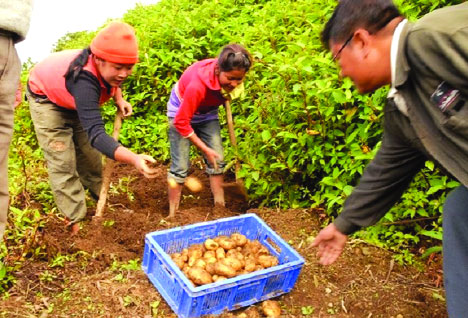Though the Central Government has launched several schemes to develop the country’s organic agricultural hub, what this region needs is brand building and marketing
Untouched by the Green Revolution, much of the North-East India continues to be “organic” with limited use of chemical inputs, and farmers practicing traditional methods of farming. The hilly terrain, fertile plains, agro and forest biodiversity, wetlands, and good rainfall have supported the growth of organic agriculture. A variety of organic crops, including tea, Joha rice and lemon in Assam, large cardamom and ginger in Sikkim, king chillis in Manipur, sugarcane, cowpea and paddy in Mizoram, passion fruit in Meghalaya and pineapples in Tripura are grown in this part of India. While some Indian corporates such as Chamong Tee Exports Private limited recognised the export potential for commodities such as organic tea from Assam as early as 1990s, the exports other organic food products from the region continues to be low.
According to the Agricultural and Processed Food Products Export Development Authority's (APEDA) data, only two North-Eastern States — Assam (11 metric tonnes) and Meghalaya (1 metric tonnes) exported organic products in 2016-2017. Thus, despite being an organic food hub, farmers in this region are still far from the export market which could have helped them earn a premium price for their produce.
Realising the potential of this region, and to help increase the farmers' income, the Central Government has taken various initiatives to develop the North-East as an organic agricultural hub. The Ministry of Development of North-Eastern Region has set up the “Mission Organic Farming North-East” to develop traditional ways of organic cultivation. The Ministry of Agriculture and Farmer's Welfare launched the scheme — “Mission Organic Value Chain Development for North-Eastern Region” in January 2017, in which Rs 115 crores have been allocated to link farmers in North-East to their consumers, and to support the access and availability of organic inputs. A total of 572 organic clusters have been developed under the Ministry of Agriculture and Farmer's Welfare's Paramparagat Krishi Vikas Yojana (PKVY) scheme in partnership with the State Governments for the self-certified Participatory Guarantee System of India (PGS-India) farmers (see Table 1).
State Governments of Manipur, Mizoram, Sikkim and Nagaland have formulated organic policies. In January 2017, Prime Minister Narendra Modi declared Sikkim to be India's first fully organic State and Mizoram followed it by announcing that it will not allow use of chemical fertilizers and pesticides. While Mizoram is a pioneer in developing State organic policy as early as July 2004, Sikkim is one of the leading States to have a State-owned organic certification body (Sikkim State Organic Certification Agency) for third-party certification.
Despite these initiatives, organic production and exports from the North-Eastern part of the country are still low. The reason lies in the variations across States in terms of their approach to organic policy, and in making available the desired infrastructure required for organic crop production, transportation and exports. The total number of regional councils to support PGS-India is only 29 in the North-East, compared to 221 in the State of Kerala.
The situation is even more complex for farmers who want to be certified by a third-party certification body under the National Programme for Organic Production (NPOP), which is mandatory for exports. While large farmers and tea estate owners get their certification done through certification bodies based in Kolkata and other cities, majority of farmers are unable to connect to the certification bodies. Cost of third-party certification is high but in many cases, corporates sourcing the organic produce support the farmers by covering the cost. In the case of North-East, very few corporates are sourcing from the region due to the lack of supply chain infrastructure and connectivity. There is a lack of basic facilities such as pack houses, cold storages and refrigerated vehicles, and even Government funded schemes such as the Mega Food Park Scheme of the Ministry of Food Processing Industries have not been successful in developing the requisite infrastructure.
While “Mission Organic Value Chain Development for North-Eastern Region” will help mitigate some of the infrastructure gaps, there is need for more laboratories, certification bodies and regional councils in the region. As the majority of Indian consumers are unaware of the variety and quality of the produce from this region, there is need for brand building and marketing to promote products such as Joha rice from Assam and king chillis from Manipur. The Central and State Governments can work together to create third-party certified organic clusters and market these through APEDA. Foreign buyers may be encouraged to source from these clusters. Seminars and workshops may be organised in these States where sector experts, certification bodies, foreign and Indian organic companies, and embassies would be requested to participate, which can help market the “North-East brand” produce.
Ideally, the focus of the Government should be to convert more clusters from voluntary self-certification (PGS-India) to mandatory certification (NPOP), which is recognised by key export markets such as the US and the EU. However, since majority of the farmers in the North-East are poor and have adopted PGS-India scheme, it is important for the Government to come up with a policy that allows PGS-India farmers to export to ASEAN member countries and other countries such as Brazil, Argentina and South Africa, which have provisions for PGS in their domestic policy. Given the Government's commitment to develop the North-East as an organic hub, these measures will help the region reach its potential, and link farmers from this part of India to rest of the country and abroad.


























